The Dream of the Red Chamber
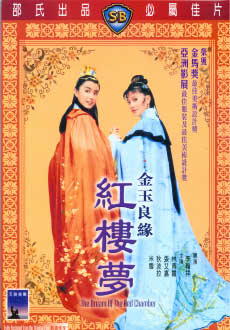
Director: Li Han-hsiang
Year: 1977
Rating: 7.0
In the late 1950’s/early
1960s’s Li Han-hsiang directed some of the Shaw’s most famous classics with
a series of lavish historical costume dramas and Huangmei’s (Chinese opera).
Films such as “Diau Charn”, “The Kingdom and the Beauty”, “The Enchanting
Shadow “ and “Love Eterne” were in fact so successful at the box office that
Li felt confident in severing his ties with the Shaw’s and moving to Taiwan
to set up his own production house. There though he ran into problems with
bloated budgets and empty seats and his company was a financial disaster.
He came back hat in hand to the Shaw’s in the 1970’s but he now mixed his
costume dramas with a large number of soft-core sex films that had become
very popular at this time – with titles like “Legends of Lust”, “That’s Adultery”
and “Illicit Desire”. The title “The Dream of the Red Chamber” might lead
one to assume that this was another of his incursions into the realms of
the ribald, but it is far from it.
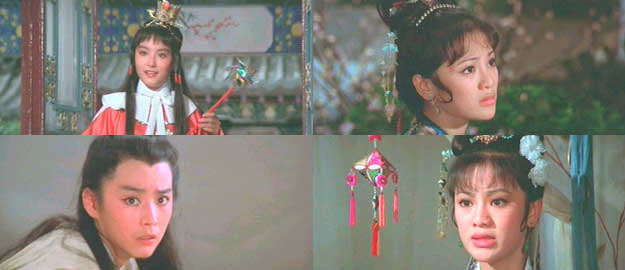
The Dream of the Red Chamber (published in 1791 some thirty years after
the author's death) was an epic novel written in the Qing Dynasty by Cao
Xue Qin (1717 - 1763) depicting the lives in the Jia Mansion – an enormously
wealthy and influential family in seeming decline. A strong matriarch and
other female members run the family and the men seem powerless in their wake.
The matriarch’s son is something of a weakling and the final hopes of the
family now reside with the lone male heir, Master Bao. The women of the household
though have spoiled him to such an extent that he too has become something
of a petulant man-child and this lack of a strong potent heir is a cause of
great concern. Into the mansion comes an orphaned female cousin, Dai Yu, and
she and Master Bao become good friends. Later another female cousin arrives,
Sister Bao, and she too aims for the affection of the heir in the family.
Though the book runs over 2,000 pages and apparently covers a huge amount
of territory, the film adaptations tend to focus on the central romance within.
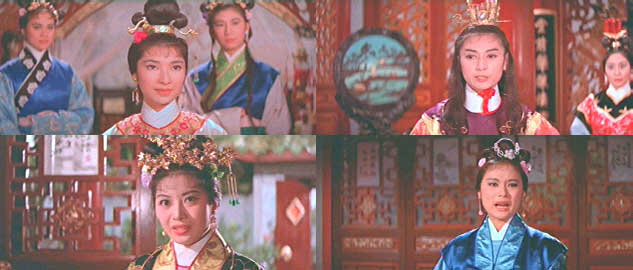
The book has been made into a film on a number of occasions – in fact the
Shaw’s had already adapted it into a Huangmei film back in 1961 with Betty
Loh Ti (Dai Yu), Jen Chieh (Master Bao), Pat Ting Hung (Sister Bao) and Margaret
Tu Chuan, King Hu and Grace Ting Ning as three of the servants. The re-make
from 1977 is remarkably like the former film – almost the exact same plot
points and often the same dialogue – so one might wonder what the point was
of re-doing what was considered a classic film in the Huangmei genre. The
answer to that is perhaps a simple one – Brigitte Lin.
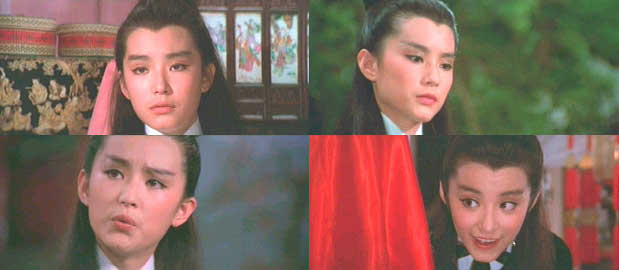
One of the strange disconnections of Hong Kong film during this period was
Brigitte Lin and the Shaw Brothers. Brigitte Lin was one of the biggest female
Mandarin stars of the 70’s and the Shaw Brothers had the most successful Mandarin
studio in the 70’s and yet they oddly only collaborated this one time (she
was to do one other Shaw film – the 1988 “Starry is the Night” – but the
studio had for all intents already shut down their film arm). Beginning in
1973 Brigitte had become a huge star in Taiwan cranking out one weepie after
another and the Shaw’s recruited much of their talent from that country –
so why not Brigitte? The same could of course be said about a number of Taiwanese
stars such as Charlie Chin, Chin Han and Ling Feng Jiao (who was to become
Jackie Chan’s wife).
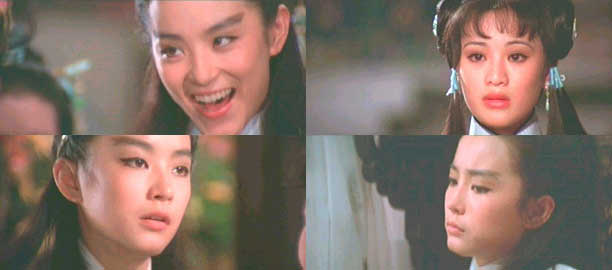
Perhaps they felt they were such big stars in Taiwan that being a Shaw contract
player would be a diminishment of their value or perhaps the two industries
did their best to stay separate. This would change completely in the early
1980’s after the Taiwanese film industry collapsed and all the Taiwanese actors
shifted to Hong Kong. But it’s hard not to consider what Brigitte could have
done working with the Shaw Brothers – especially if she had worked with director
Chor Yuen in some of his lush wuxia’s. At the same time though you have to
wonder if she had made a number of films for the Shaw’s whether Tsui Hark
would have turned to her as his muse in the 1980’s - and what would Hong
Kong film have been like without “The Look” that shook the film world. As
it is, at least we get one glorious shot of Brigitte in this Shaw “yellow
plum” Chinese opera – as a man!
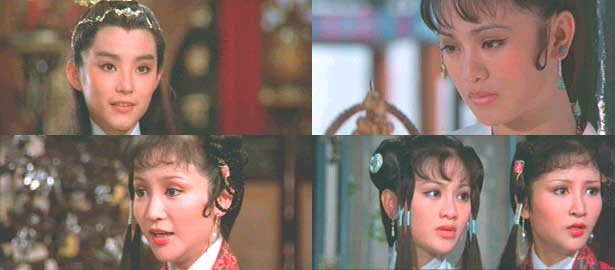
As was the custom in these films the lead male was played by a female actress
and Brigitte gets to fill the role of Master Bao while another Taiwanese actress
in her first (and perhaps only?) Shaw film plays Dai Yu. This was the marvelous
Sylvia Chang. I have been told that originally the two actresses were intended
to play the opposite role, but when they showed up on set the filmmakers
realized that Brigitte towered over the diminutive Sylvia and switched them.
One might suggest this was a foreshadowing of Brigitte as “Asia the Invincible”,
but that would be stretching things considerably. There is absolutely nothing
masculine or powerful about her portrayal in this film and not for a nanosecond
does the viewer think of her as anything but a woman. They don’t even really
attempt to flatten her chest to any degree and it’s hard to take a man with
breasts very seriously. Brigitte was the Chinese Sweetheart – considered
one of the most beautiful women ever on screen – the last thing Li was about
to do was hide this beauty behind a male veneer.
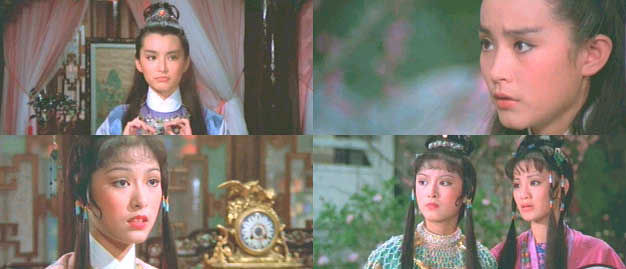
While Jen Chieh had played a fairly straight – if weak-chinned – Master
Bao in the 1961 version, Brigitte announces her femininity immediately in
her/his entrance by skipping gaily and playing with a toy spinning wheel.
Throughout the film, she spills over with giggles, laughter, coquettish flirting
and pouts so big you could land a plane on her bottom lip. She is spectacular
– this film plays at times like a homage to her beauty – capturing her many
emotions in close up like a stun gun – if I had been watching this on a big
screen there were times when her mournful eyes would have knocked me three
rows back and had me begging for mercy. For any Brigitte fan who simply enjoys
reveling in her beauty, this is a must-see. Now on to the film.
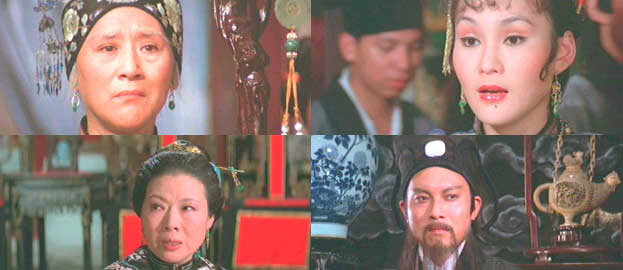
After her parents have died, Dai Yu (Chang) is taken in by the Jia family
and treated kindly but always a bit like a poor relative with the exception
of Master Bao (Lin) who immediately takes to his cousin and they quickly become
childhood friends. Among the ruling women in the family are the Matriarch
– Master Bao’s grandmother (Wang Lai), Master Bao’s mother (Ouyang Shafei)
and the aunt, Madame Lian (Hu Chin), and they look on this childhood friendship
as a passing thing. As Master Bao grows older he becomes something of an innocent
flirt with women and in one instance gets a thrashing from his father (Yueh
Hua) for becoming familiar with someone beneath his station. Interestingly,
in the 1961 version the woman is a servant that gets Bao in trouble but they
change that here to an actress who tells him “An actress is basically a lowly
person. Slightly better than a whore and a musician and even less than a dog”.
How things had changed by the time this film was made! Of course, Master Bao
seems so clueless around women and honestly so sexless, that his supposed
flirtations seem nothing more than childhood playing.
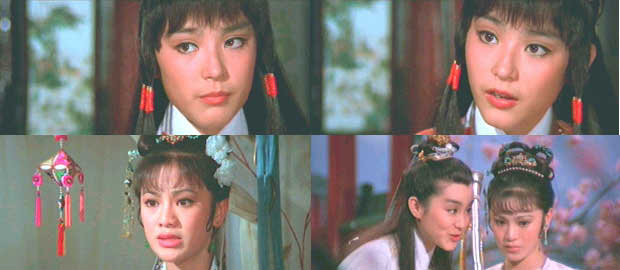
One day another cousin turns up on the doorstep to stay with the Jia’s –
a somewhat more prestigious relative – Sister Bao (Michelle Mei Suet) – and
she sets her sights on Master Bao. The servants stir up gossip about which
woman Master Bao favors - among them Kara Hui Ying Hung and Dai Yu’s
loyal servant Ji Juan (played by Deborah De). A few years pass and the friendship
between Bao and Dai Yu turns to love – you can tell because they sing duets
to one another as birds chirp – but things begin to go awry when Ji plays
a joke on Master Bao to see how much he truly loves her mistress. She tells
Bao that Dai Yu is leaving to get married where upon he goes mad and nearly
catatonic and this so worries his family that they decide it is time to marry
him off and hopefully force him to grow up. Not to Dai Yu, but instead to
Sister Bao and to trick him by telling Bao that he is marrying his true love
but substituting Sister Bao behind the wedding veil. Tragedy ensues.
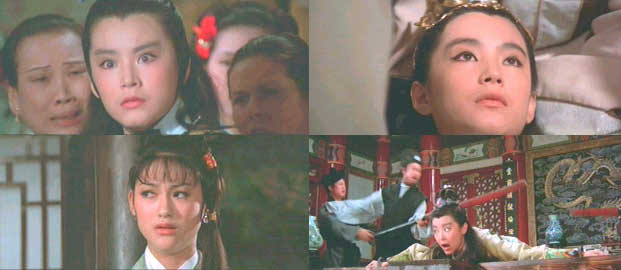
It has more of an emotional kick than one might expect – primarily due to
the entrancing performances from Brigitte and Sylvia – both who are simply
adorable in this film. It is hard to completely accept the romance due to
the fact that you never can take Brigitte at all seriously as a man – but
at the same time you are able to suspend your belief enough to care about
these two people so desperately in love with one other. The music, which for
many viewers is a prime reason to avoid these films, is actually not hard
on the ears. They toned down the operatic elements considerably from the
earlier version and this for the most part is closer to Mandarin pop than
it is to Chinese opera. There are connections to Tsui Hark here other than
Brigitte. Sylvia was of course to star in two of his films – Aces Go Places
III and the classic Shanghai Blues. Michelle Mei Suet was to appear in his
first film, Butterfly Murders, as Green Shadow and Deborah De was later to
marry Patrick Tse and give birth to Nicholas who was to star in Tsui’s “Tide
and Time”. As another point of mild interest, Ivy Ling Po – considered perhaps
the greatest of the Huangmei stars – adapted this film only a year later
in 1978 for her own production company. And one last tidbit - in an earlier
version ("Modern Red Chamber Dream" 1952) that had updated the story into
modern times and starred Li Lihua as Dai Yu, also had Ouyang Shafei (who
plays the mother in this version) as the rival love interest.
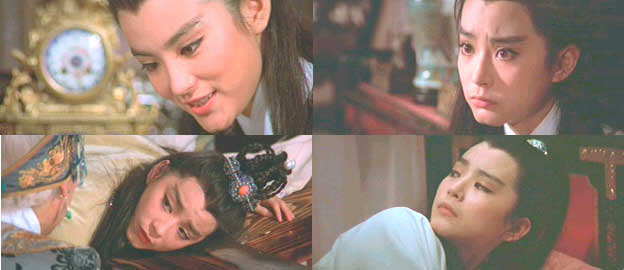
My rating for this film: 7.0
In a recent interview Sylvia Chang was asked
what was her toughest role to play in her career:
"That is a very difficult question to answer,
I would not say the best film that I've done, but I'd say the most challenging
film I've done, one that was a long long time ago called 'The Dream of the
Red Chamber'. It's a very classic -- it's based on a classic Chinese novel
-- and I have to play this very well known, classic, Chinese character which
I was not a bit of that kind of character very different from my own personality
and so that was the most challenging character that I've ever done. I really
devoted great time and a lot of effort to that character, which afterwards
I just felt I just have to get away for a while so I can get out of that (LH:
Really? It was that intense? SC: Yes, yes LH: Wow, gosh) "











